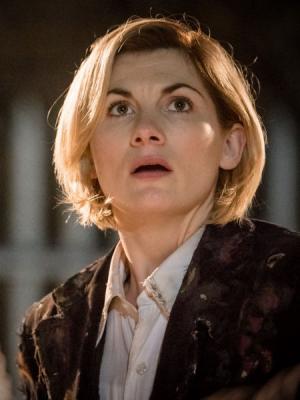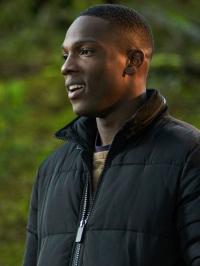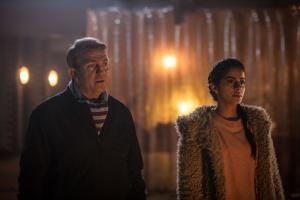
Written by Chris Chibnall
Directed by Jamie Childs
Starring: Jodie Whittaker, Tosin Cole, Mandip Khan,
Bradley Walsh, Sharon D Clarke
First broadcast 6.45pm, Sunday 7 October 2018
I'm the Doctor - Sorting out fair play throughout the universe......
Writer Chris Chibnall, and Director Jamie Childs finally present to us The Woman Who Fell To Earth. It feels like it has been a long time coming (which it has). Now for the big question...was it worth the wait? Absolutely. 100%.
There are spoilers in this review - so if you haven't seen the episode yet, and want to stay in the unspoiled, please come back later.
Talking of spoilers, I must say that the new team have done EXCEPTIONALLY well at keeping key story points away from prying eyes, something which is an amazing feat in this day and age, and is a factor that I'm sure will help this new series of Doctor Who become appointment television once more.
The Woman Who Fell To Earth is a story that has the theme of family solidly at its core. As the story unfolds we are first introduced to Ryan Sinclair (Tosin Cole), who at nineteen years of age is learning to ride a bike. Ryan has dyspraxia, a condition which has affected his co-ordination. The dyspraxia features in the story later on, and it is great to see the writer not being afraid at bringing something like this to the fore of the story, and to make it a positive factor for Ryan, by shaping his determination.
Ryan's Nan, Grace (Sharon D Clarke), and her husband of three years Graham O'Brien (Bradley Walsh) are trying to encourage Ryan in his efforts, which end with a very frustrated Ryan throwing the bike off a cliff. When Ryan tries to retrieve the bike he stumbles across some strange, glowing geometric shapes, that when touched, result in a large blue...blob suddenly appearing. Ryan calls the police and as a result we meet Yasmin Kahn (Mandip Gill).
From here the action moves swiftly onto a train that is under siege by an alien force. Graham and Grace are both caught up in events, urging Ryan and Yasmin to rush to help them. It is here that our new Doctor literally drops from the sky and takes complete control of the situation. Jodie Whittaker's first scenes immediately reassure the viewer that the character of the Doctor is in very safe hands.
 What follows (for the most part) is a regeneration story that (I would say) is most comparable to The Eleventh Hour. In it we have an alien warrior on a hunt, which once the hunt is completed, will ensure his succession on his home world. It of course falls to the Doctor and her new friends to stop him, and protect the hunter's prey.
What follows (for the most part) is a regeneration story that (I would say) is most comparable to The Eleventh Hour. In it we have an alien warrior on a hunt, which once the hunt is completed, will ensure his succession on his home world. It of course falls to the Doctor and her new friends to stop him, and protect the hunter's prey.
Along the way we learn that the TARDIS is missing and that the Doctor can build a sonic screwdriver by combining a small piece of alien technology along with some spoons. We also learn that the Doctor will stop at nothing to protect her new friends, and even strangers.
Things suddenly become very serious towards the end of the story, with the surprising, and rather shocking death of Grace. The aftermath of which is very sensitively handled. So much so in fact that I did wonder how the Doctor's new friends would be written into the next story, which is resolved quite simply by the Doctor accidentally kidnapping them all.
Oh - and along the way the Doctor gets her new outfit from a charity shop - which I think is quite a perfect way for her to acquire new clothes.
The story positively romps along. Chibnall obviously loves the characters that he has created. The background on the companions (there I have said it! Companions!) is quite rich. Ryan gets the most development. The story opens with him saying the line "So today, I want to talk about the greatest woman I ever met." Of course at the start of the story we immediately think that he is referring to the Doctor, but by the time we reach the end, and catch up with Ryan, we realise that he is referring to his Nan, Grace. It's a clever and beautiful piece of writing.
Graham also get's his fair share of screen time, with his character (as probably to be expected) having many of the funnier lines. His speech, at Grace's funeral is particularly moving. I did feel though that Yasmin could have been given more to do. This is something that I am hoping is put right in future episodes.
So what of the new Doctor? well, she actually drops into a scene to the beats of the Doctor Who theme (more on that later). Here we have a massively confident debut for Jodie Whittaker. For me there were two absolutely defining moments. The first was her rather beautiful description of the regeneration process. Never has regeneration, and what it does to a body and mind been summed up so perfectly and in so much detail. The second is the crane top speech to the alien hunter, which immediately shows that she stands firmly shoulder to shoulder with any man that has gone before her. The characterisation is re-assuringly the Doctor. She is quirky, full of energy, brave, kind and absolutely outraged in the face of injustice.
The feel of the show is fresh, and this isn't just because we are in Sheffield, and not Cardiff. The effects are very well realised and rather beautiful, especially in the rendering of the alien's other worldly Gathering Coils, a frenetic tangle of metallic tendrils and lights. Jamie Child's direction is urgent, but at no point does anything feel rushed.
 The biggest contribution to the shows freshness is the writing. By killing off a seemingly major character in the shows first episode, Chibnall has created a feeling of very real threat and menace, and also a plot line that should bring two of the characters closer together. In the shows closing minutes the Doctor's new friends are literally dragged into her next adventure, which in itself should create some interesting character dynamics.
The biggest contribution to the shows freshness is the writing. By killing off a seemingly major character in the shows first episode, Chibnall has created a feeling of very real threat and menace, and also a plot line that should bring two of the characters closer together. In the shows closing minutes the Doctor's new friends are literally dragged into her next adventure, which in itself should create some interesting character dynamics.
Ah! - The theme! There's no blast of the new theme tune at the beginning of the story. In fact there are no credits at the start of the show all. However we do get to hear the new version over the end credits. Personally I think that new composer, Segun Akinola's closing theme is the best since David Tennant departed. Don't get me wrong, I loved Murray Gold's music, but I thought the main theme had lost i's way through Smith and Capaldi's tenure. I can't wait to hear his version played over the opening credits next week. To me, Akinola's main theme reminded me of McGann's. The incidental music throughout is also very good, and different to what has come before, but this again further freshens the feel of the show.
The Woman Who Fell To Earth is a confident opener to this new series, and an episode that heralds an exciting new era for Doctor Who. The story made this viewer laugh, shed a tear, and kept me gripped throughout - which for me means that the show hit all the right notes. In it we find a confident, yet down to earth Doctor, surrounded by new faces both in front of and behind the camera. Personally, I can't wait to see where they all take us next.







